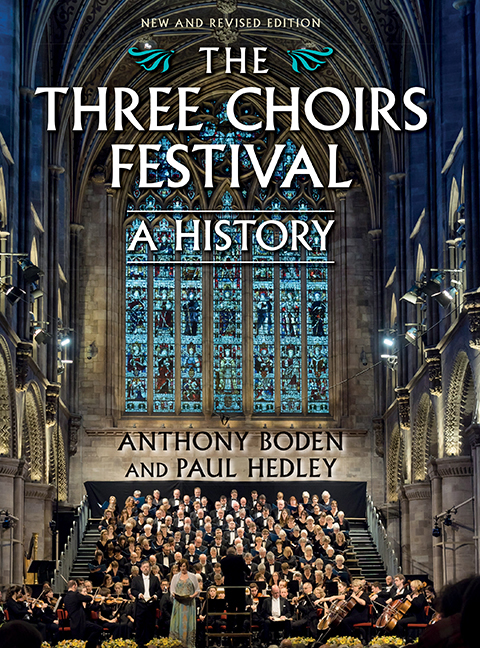Book contents
- Frontmatter
- Contents
- List of Illustrations
- Preface
- Acknowledgements
- List of Abbreviations
- List of Cathedral Organists
- 1 Origins
- 2 A Fortuitous and Friendly Proposal
- 3 A Numerous Appearance of Gentry
- 4 ‘The Musick of my Admiration Handel’
- 5 The Gentlemen and the Players
- 6 Avoiding Shipwreck
- 7 Prima voce
- 8 Favourites and Flops
- 9 Sacred and Profane
- 10 Froissart
- 11 The Unreasonable Man
- 12 The Dream
- 13 Beyond these Voices
- 14 An Essentially English Institution
- 15 The Elgar Festivals
- 16 Dona nobis pacem
- 17 Recovery
- 18 Association
- 19 A New Epoch
- 20 Jubilee
- 21 Theme with Variations
- 22 Houses of the Mind
- 23 ‘A Gold-Plated Orchestra’
- 24 A New Millennium
- 25 Reorganisation
- 26 An Invitation to the Palace
- Appendix Three Choirs Festival Timeline
- Select Bibliography
- Index
- Plate section
26 - An Invitation to the Palace
Published online by Cambridge University Press: 11 August 2017
- Frontmatter
- Contents
- List of Illustrations
- Preface
- Acknowledgements
- List of Abbreviations
- List of Cathedral Organists
- 1 Origins
- 2 A Fortuitous and Friendly Proposal
- 3 A Numerous Appearance of Gentry
- 4 ‘The Musick of my Admiration Handel’
- 5 The Gentlemen and the Players
- 6 Avoiding Shipwreck
- 7 Prima voce
- 8 Favourites and Flops
- 9 Sacred and Profane
- 10 Froissart
- 11 The Unreasonable Man
- 12 The Dream
- 13 Beyond these Voices
- 14 An Essentially English Institution
- 15 The Elgar Festivals
- 16 Dona nobis pacem
- 17 Recovery
- 18 Association
- 19 A New Epoch
- 20 Jubilee
- 21 Theme with Variations
- 22 Houses of the Mind
- 23 ‘A Gold-Plated Orchestra’
- 24 A New Millennium
- 25 Reorganisation
- 26 An Invitation to the Palace
- Appendix Three Choirs Festival Timeline
- Select Bibliography
- Index
- Plate section
Summary
IT was on an afternoon in early June 2015, while working on final preparations for the Hereford Festival, that the Three Choirs management were invited to attend a meeting at the London residence of the Festival's president, the Prince of Wales. Despite knowing very little about what would be discussed, there was no doubt that the invitation would augur something quite significant.
The Chief Executive and his assistant found themselves, some days later, in a beautiful room in Clarence House with a surprising number of others, including representatives from the Prince's staff and senior members of the firm that runs events at Buckingham Palace. In short, it transpired that Prince Charles was offering to recognise the tercentenary of the Festival by hosting a performance in the ballroom at Buckingham Palace. In terms of the numbers of performers, this would be perhaps the largest concert ever held in that space. Organising the event was to prove hugely challenging, and required much dedicated work; but the result was extremely successful from all angles.
Organising a concert in any such significant space is never straightforward, but the challenge of doing so with a massed choir of 300, an invited audience in excess of 400 (all of whom had to be vetted), and a little-used historic organ was immense. Very early in the planning the decision was taken to involve all of the Festival's ‘in house’ choirs – massed chorus, cathedral choirs and Youth Choir – who would each perform alone and together in a programme intended to capture the nature of the Festival, past and present. Logistically, it was no small feat to transplant such a large number of performers to London, particularly given the Prince's wish to spend time with each group of performers following the concert. Little rehearsal time was available – a constraint which impacted significantly upon the assistant organists, who were required to adapt extremely quickly to a difficult instrument. The Palace organ pre-dates such modern niceties as registrations, and so three organists were required at any one time: one organist playing, one selecting stops to his left, and one selecting stops to his right.
- Type
- Chapter
- Information
- The Three Choirs Festival: A HistoryNew and Revised Edition, pp. 430 - 432Publisher: Boydell & BrewerPrint publication year: 2017



